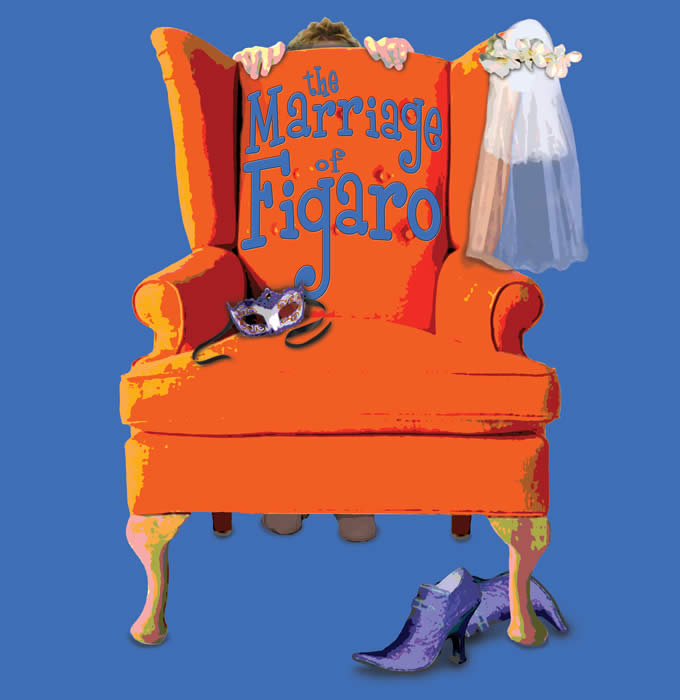Muhlenberg's 'Marriage of Figaro' brings Beaumarchais's 18th century comedy to a modern audience
 Director Francine Roussel's production will feature an original musical score by Lehigh Valley composer Mike Krisukas
Director Francine Roussel's production will feature an original musical score by Lehigh Valley composer Mike Krisukas
Thursday, April 11, 2013 03:54 PM
"The Marriage of Figaro" is known worldwide to opera aficionados and Bugs Bunny fans from the opera composed by W.A. Mozart. Less well-known to modern audiences is the 1784 comedy by French playwright Beaumarchais, upon which Mozart based his opera.
The Muhlenberg College Theatre & Dance Department will present the Beaumarchais play as the finale to its 2012-13 Mainstage Series, April 25-28. Directed by Francine Roussel, the production will feature an original score by composer and musician Mike Krisukas, known to Lehigh Valley audiences as the guitarist and lead songwriter for the band Zen For Primates.
"'The Marriage of Figaro' is so well built, the characters so real, and the spirit of the play so uplifting that it deserves exposure to an American audience," Roussel says. "Opera buffs may know the Mozart classic, but less often the play on which it is based. On Beaumarchais' behalf, we hope to rectify that inequity."
Writing a few years before the French Revolution, Pierre-Augustin Caron de Beaumarchais pours his rage at the aristocracy into "The Marriage of Figaro," which manages equal parts hilarity and outrage. First produced in 1784, the play was a sequel to "The Barber of Seville," picking up three years after the wedding of the Count and Countess that concludes that play. Now Figaro, the Count's valet, plans to marry, but the Count has tired of his lovely Countess and lusts for Figaro's bride-to-be, Suzanne. He determines to revive the ancient "droit du seigneur" — the lord of the manor's right to bed any new bride on her wedding night.
Figaro, Suzanne and the Countess concoct a counter-plot, but the Count's page, Cherubin, makes hash of it through his passionate crush on the Countess. The multiple layers of misunderstanding yield what Roussel calls "one of the most perfect farce scenes of all time," in one of the most scathing critiques of aristocratic privilege ever written.
"Le droit du seigneur — while anathema to modern sensibilities — was the 'natural order' for the aristocracy in much of 18th century Europe," Roussel says. "Beaumarchais had the temerity to write a comedy about this shocking practice, subtly undermining class privilege, exposing gender inequalities, and revolutionizing the condition of women. Danton claimed that 'Figaro killed off the nobility.' Perhaps — but with laughter, not the guillotine."
Krisukas says his starting point for the show's original score was his and Roussel's mutual interest in Spanish flamenco styles.
"Part of the excitement in entering a new artistic project is the opportunity to be quickly thrust into a new world," Krisukas says. "It's like going on a journey and immersing yourself in some new land with its own culture, language, history and artistic perspective."
The production also features original choreography by Nina Pongratz, scenic and lighting design by Curtis Dretsch, and costume design by Liz Covey.
"All Will End with Joyful Songs: A Panel Discussion" will be held Thursday, April 25, at 12:30 p.m. in the Recital Hall, Baker Center for the Arts. This discussion will provide unique perspectives on the content and context of "The Marriage of Figaro." Theatre professor James Peck and French professor Kathy Wixon will moderate the discussion. The panel will include Roussel, Krisukas, Pongratz, and students of Wixon's French Theatre of the Resistance course.
Muhlenberg College is a liberal arts college of 2,200 students in Allentown, Pa. The college offers Bachelor of Arts degrees in theater and dance. The Princeton Review consistently ranks Muhlenberg's production program in the top ten in the nation, and the Fiske Guide to Colleges lists both the theater and dance programs among the top small college programs in the United States.
Performances of "The Marriage of Figaro" are April 25-28: Thursday through Saturday at 8 p.m and Sunday at 2 p.m. Tickets are $15 for adults and $8 for LVAIC students, faculty and staff and for patrons 17 and under.
Performances are in the Baker Theatre, Trexler Pavilion for Theatre and Dance, Muhlenberg College, 2400 Chew St., Allentown. Performance information and tickets are available at 484-664-3333 or muhlenberg.edu/theatre
